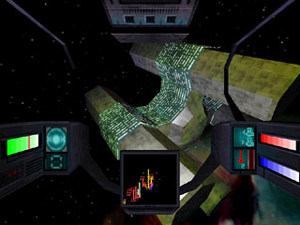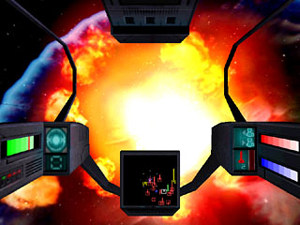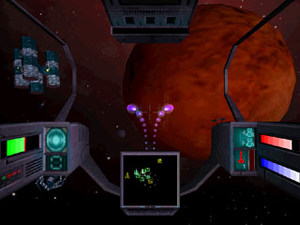If The Wall Street Journal Had Written Star Wars…
At the heart of every good space combat game is Star Wars. Ever since
Wing Commander defined the genre in 1989, the paradigm of space combat
is to throw you into a high tension, high drama battle in space with distinct
atmosphere, characters, ships, and style. It didn’t matter whether you were
flying down the Death Star trench in X-Wing,
single-handedly assaulting the K’Tithrak Mang Kilrathi HQ in Wing Commander
2, or taking down the Lucifer in Descent:
Freespace, it was all Star Wars, it all had that feel.
A space combat
game has to have a few key ingredients. It must have a gripping plot-line full
of tension, drama, well defined characters, and action. It has to have an engaging,
playable flight model along with heavy hitting weaponry. It has to throw you
into several different craft, from space-cow bombers to nimble fighters. And
finally, it must have graphics and sound that make the entire experience believable.
If for one moment, you feel like you are playing a game, instead of saving the
universe, then the whole thing is shattered.
Most space combat titles either put you in one of two roles. The first role
is that of a legendary pilot who will single-handedly save the species (Luke
from Star Wars, or Christopher Blair from Wing Commander). The
second role is the good pilot who plays a critical role in the war effort but
doesn’t get any special treatment (such as Wedge from Star Wars, or the
nameless avatar in the X-Wing and Freespace games).
A few games put you in the shoes of a freewheeling, trading, space fairing
loner (Han Solo, or your character in the Privateer
games.) This third category, of which SouthPeak’s X-Beyond The Frontier
is a member, has been around for quite a while. It was pioneered in the early
eighties by the old 8-bit classic Elite and perfected in the early nineties
by Wing Commander: Privateer. To make a good game in this vein, the designers
have to create a feeling of freedom within a looming, nonlinear plot. They also
have to fill the universe with interesting, defined locales and colorful characters
in order to further the story and create the feeling of travel and vast expanse.
Finally, they have to give you immense control over your ride, from ship model
to individual systems and weapons, so that you can travel space in the Millenium
Falcon, or just a regular Correlian Freighter, depending on if you want to splurge
on all the ‘special modifications.’ [Johnny, you’re such a geek. ~Ed]
Do all that, and you have one excellent game. Don’t, and things get boring real quick.
That might be a long way of getting to the point, but basically, X-Beyond
the Frontier is a failure on all counts. It manages to deftly avoid following
every one of the guidelines just mentioned and the result is a painfully boring,
uninspiring, and totally un-involving experience.
The premise is that in the future, 500 years after a disastrous war against
sentient machines (they designers read Dune, I see), scientists create
a small ship that has it’s own jump drive so that it doesn’t rely on the long
since destroyed interstellar jump gates. While conducting the first test of
the device, in the aptly named X-Xperimental fighter (note: the letter ‘X’ is
a curse to games, just look at the ‘Xtreme’ series of crud), something goes
wrong and you are hurtled across the galaxy to some uncharted region. Soon after
you get there, some aliens tell you that you have to become a trader to make
money, so that you can pay them back for repairing your ship which was critically
damaged in the jump.
From there you spend most of your time flying from station to station, buying
and selling. There are elements of diplomacy, 6 alien races, and some combat,
but all of it is kept on the backburner next to the wildly entertaining task
of flying back and forth, forth and back form station to station to make cash,
until you can buy a factory of your own and fly back and forth a little less
often. While the stated intention of the game is to be an Elite for the
21st century, it can’t even measure up to that decades old title, much less
Privateer.
 Here is why:
Here is why:
1) The story is lightweight and mostly non-present. Furthermore, it doesn’t
really effect your action much.
2) Many of the trappings of freedom, such as joining guilds, taking mercenary
and charter jobs, and talking to people in space bars is either not there or
very rarely there. In fact, every port you go to is just a shopping screen.
You can’t walk around a spaceport, or a planet, and there is nothing to add
any atmosphere to any of the locales.
3) Combat is terrible. The ship, which is the only one you get, handles like
a pregnant cow.
4) The graphics are atrocious. While the backgrounds and some of the special
effects are passable, the modeling of the ships and structures is pathetically
amateurish. Not one object in the game can suspend your disbelief. Especially
after seeing how good space can look in Freespace
2, X is abhorrent to the eyes.
5) The sound isn’t very good, and the music is like something out of a PBS
documentary on New-Wave music. It is intended to instill awe at the expanse
of space, at the expense of any talent.
6) There are some technical issues, some control problems, and the entire
game has a distinctly unfinished feel. In fact, there are portions of the game
which refer to it as a demo. Clearly X isn’t quite ready for prime time.
X-Beyond the Frontier, reminds me of nothing more that a shareware
title. Lacking ingenuity or talent, it simply doesn’t feel like a ‘real’ game.
While not a technical disaster or a malicious creature, it is nonetheless a
stunning example of how to make a game that lacks the quintessentially important
fun factor. Even at $20, X-Beyond the Frontier is overpriced. If you
want to play an Privateer style game than you should try to find a copy
of Privateer. As old as it is, it does everything right with vastly inferior
technology that X does wrong.
Forget X-ploration, it’s better to stay in the known universe with Confed,
the Kilrathi, the Shivans, the GTVA, the Empire, and the Rebel Alliance. Beyond
the Frontier there seems to be nothing more than a quagmire of ennui.

-
Not a malicious creature
-
Excruciatingly boring
-
Terrible graphics
-
Ship handles like a pig
-
No real style
-
Doesn't feel finished
-
Basically fails every test of the genre







